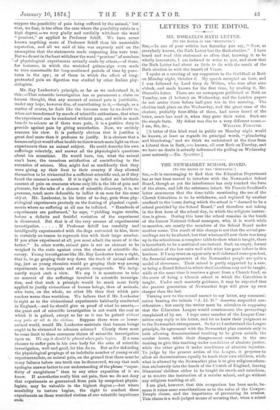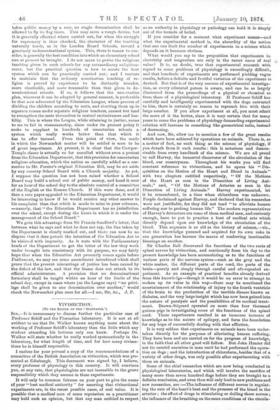THE NEWMARKET SCHOOL BOARD.
(TO THE EDITOR OF THE "SPECTATOILl
Ste,—It is encouraging to find that the Education Department has at last been moved to interfere with the Newmarket School Board, though as yet the interference has only touched the form of the abuse, and left the substance intact. Sir Francis Sandford's letter announces that the time-table mentioning the use of the Church Catechism is to be withdrawn, and replaced by another confined to the hours during which the school is "deemed to be a school provided by the School Board," and therefore not taking in the first hour of the school day, in which the religious instruc- tion is given. During this hour the school remains in the hands of the former National-School managers, who, it is worth while to mention, are mostly the members of the School Board under another name. The result of this change is not that the actual pro- ceedings are to be altered, but that whereas till now there was hung up in the schoolroom a complete table to show what is taught, there is henceforth to be a mutilated one instead. Such an empty, formal satisfaction of the law suits well with what has gone before in this business. If I may trust an apparently well-informed correspondent, the financial arrangements of the Newmarket people are quite a model of cleverness. Their school is partly supported by a rate, as being a Board School in which the Catechism may not be taught, while at the same time it receives a grant from a Church fund, on the score of being a Church school in which the Catechism is taught. Under such masterly guidance, it may be expected that the present generation of Newmarket boys will grow up even sharper than the last.
Turning now to the second answer to my letter, any communi- cation bearing the initials "J. Ll. D." deserves respectful con- sideration ; but surely the writer must be mistaken in supposing that the Education League would countenance the proceedings complained of by me. I hope some member of the League Com- mittee may reply to his letter, and let us know their judgment as to the Newmarket arrangement. So far as I understand the League principle, its agreement with the Newmarket plan consists only in both allowing denominational teaching to be given outside the secular hours, while their disagreement consists in the one desiring to give this teaching under conditions of absolute justice, while the other gives it under conditions of absolute injustice. To judge by the present action of the League, it proposes to allow all denominations equally to teach their own children, while what is allowed by the Newmarket plan is to give religious educa- tion exclusively into the hands of the Church of England, leaving Dissenters' children either to be taught its creeds and catechism, or to receive the instruction of a secular school, and go without any religious teaching at all.
I am glad, however, that this comparison has been made, be- cause it raises some considerations as to the value of the Cowper- Temple clause, and the importance of preventing its evasion. This clause is a well-judged means of securing that, when a school takes public money by a rate, no single denomination shall be allowed to fly its flag there. This may seem a rough device, but it is generally effectull where carried out, for when the struggle for supremacy is thus checked, the character of the teaching naturally tends, as in the London Board Schools, toward a genuinely undenominational system. This, there is reason to con- sider, is generally the best condition into which an elementary school can at present be brought. I do not mean to praise the religious teaching given in such schools for any extraordinary enlighten- ment, but the practical question is bow to secure the best system which can be practically carried out ; and I venture to maintain that the ordinary unsectarian teaching of re- ligion is proved by experience to be distinctly broader, more charitable, and more reasonable than that given in de- nominational schools. If so, it follows that the unsectarian plan, wherever it can be adopted by general consent, is preferable to that now advocated by the Education League, whose process of dividing the children according to sects, and shutting them up in separate rooms under separate religious teachers, cannot but tend to strengthen the sects themselves in mutual exclusiveness and hos- tility. This is where the League, while attaining to justice, seems to me to fail in statesmanship, since under its present policy it seeks to supplant in hundreds of unsectarian schools a system which really works better than that which it has to offer instead. From this point of view, the mode in which the Newmarket matter will be settled is seen to be of great importance. At present, it is clear that the Cowper- Temple clause is actually so far annulled without even a protest from the Education Department, that this provision for unsectarian religious education, which the nation so carefully added as a cor- rective to Mr. Forster's original Education Bill, may be set aside by any country School Board with a Church majority. As yet, I suppose the question has not been raised whether a School Board may build a school out of public money, and hand it over for an hour of the school day to the absolute control of a committee of the English or the Roman Church. If this were done, and if then a rate payer appealed to the Education Department, it would be interesting to know if he would receive any other answer to his complaint than that which is made to mine in your columns, —namely, that "the Education Department has no jurisdiction over the school, except during the hours in which it is under the management of the School Board."
We gain this advantage from Sir Francis Sandford's letter, that between what he says and what he does not say, the line taken by the Department is clearly marked out, and there can now be no dispute that it does permit the intention of the Education Act to be violated with impunity. As it rests with the Parliamentary heads of the Department to get the letter of the law they work under brought into consistency with its purpose, we may fairly hope that when the Education Act presently comes again before Parliament, we may see some amendment introduced which shall prove that the present miscarriage of justice has been caused by the defect of the law, and that the blame does not attach to its official administrators. A provision that no denominational formulary shall be taught within an hour of the limits of the school day, except in cases where (as the League says) "no privi- lege shall be given to one denomination over another," would check the Newmarket plan once for all.—I am, Sir, &c., J. P.



































 Previous page
Previous page